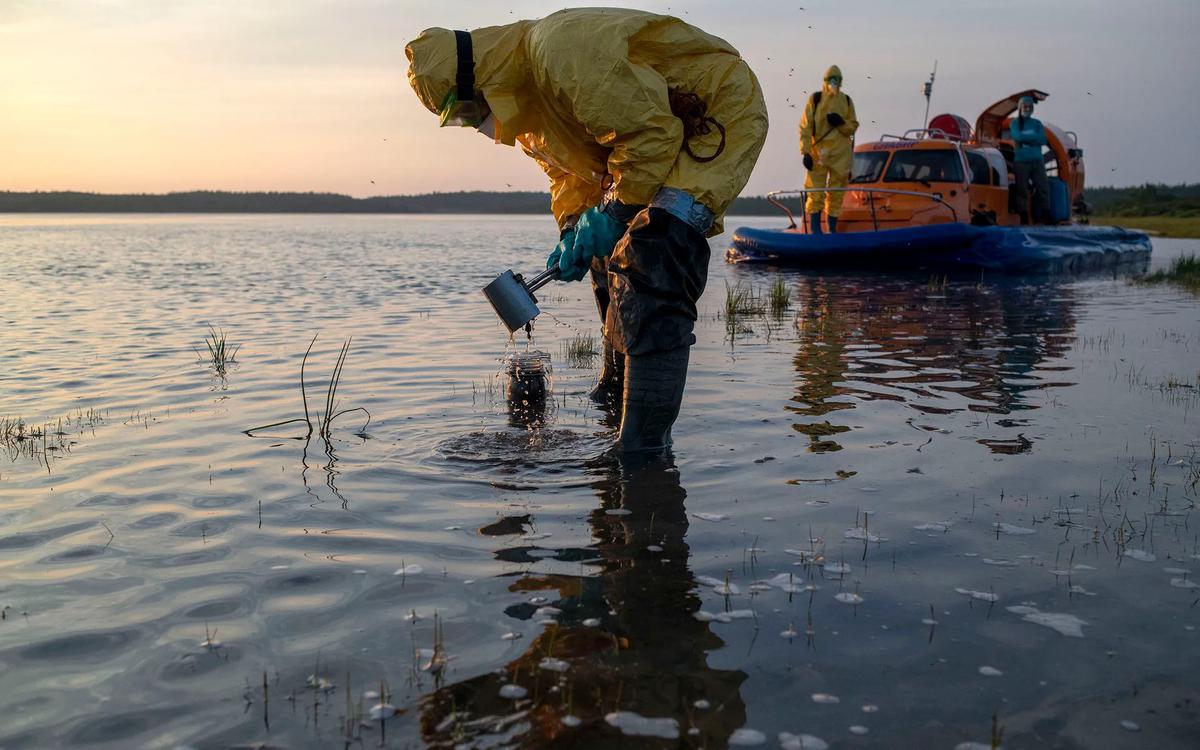This Week’s Highlights
Fear, desperation and silenced truth — we bring you a special report from the epicenter of Arctic’s largest ever fuel spill; Russian lawmkers plan an unprecedented attack on rights of transgender Russians; regions are overwhelmed with uncontrolled Covid-19 outbreaks; plus — the country is captivated by the growing Khabarovsk uprising.
Want to get the full story? Click the links below for full-length articles in Russian.
Fallout From The Arctic’s Biggest Fuel Spill
They call it 'Chechnya of the North.' This week we publish a special report from the epicenter of the largest oil spill in the Arctic near Norilsk. Our correspondents Yelena Kostyuchenko and Yuri Kozyrev, document the continuing coverup of the environmental catastrophe. They also describe the atmosphere of fear and intimidation that the company-polluter Nornickel keeps locals in so they don't speak out.
A CITY SILENCED.During the trip, our correspondents faced harassment from authorities and were detained by local police. Sources were careful about what they said, some refused to speak to all.
"We call people, make appointments, and they disappear. It happens over and over again. Phones are silent, doors are closing. We book tickets for a helicopter - they call us the day before departure: the police are now boarding, something happened, your tickets have been canceled," reports Yelena Kostyuchenko.
WHISTLEBLOWER RESIGNS.Both Nornickel and the state environmental agency Rosprirodnadzor claim that the spill is contained. But Norilsk Rosprirodnadzor deputy head, Vasily Ryabinin, released a 45-minute video exposing the disaster's real magnitude. He claimed the environmental watchdog was prevented from reaching the site by plant security and was allowed only to take water samples from certain places. Ryabinin has now handed in his resignation.
FACADE JUSTICE. Four people have been arrested in connection with the fuel spill so far, including one manager many residents say has been used as a scapegoat. Some 66,000 signatures are collected in support of him, with comments on the petition reading, "you're looking for the guilty in the wrong place." A criminal case has just been opened against Norilsk Mayor Rinat Akhmetchin for negligence concerning the spill. This week he resigned.
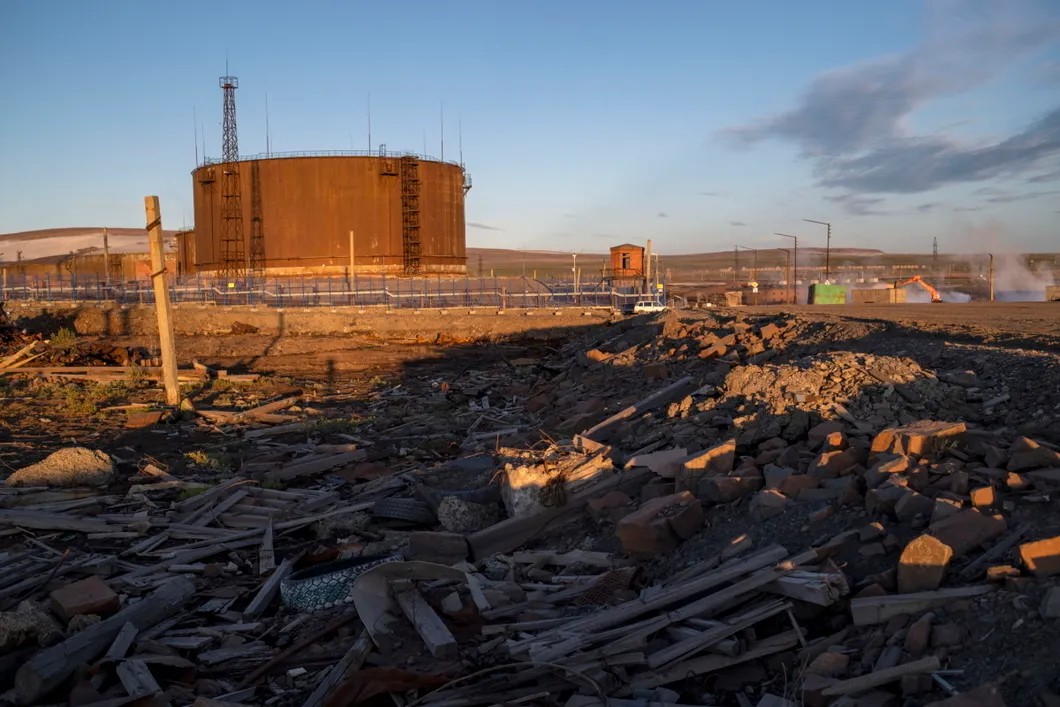
DENYING THE DAMAGE.State environmental watchdog Rosprirodnadzor has issued Nornickel an unprecedented $2.1 billion fine for the spill. But it is 'voluntarily.' And the mining giant has already disputed it, claiming that it is based on "certain assumptions, which led to the distortion of the damage estimates."
ANOTHER FUEL SPILL.Just days after Nornickel announced it would be disputing the fine, it provoked another fuel leak in the region. A pipeline operated by Nornickel subsidiary Norilsktransgaz burst near the village of Tukhard, spilling 44.5 tonnes of aviation fuel into the tundra. We have obtained pictures of the pipe, which is rusty and coming apart at the seams.
Read the full report from Elena Kostyuchenko and Yuri Kozyrev’s trip here.
Russia’s Attack on Trans Rights, Explained
More than three dozen activists are detained in Moscow and St. Petersburg for demonstrating against a draft law that would significantly roll back transgender rights. It follows on from constitutional amendments voted in earlier this month, making life more difficult for all LGBT+ Russians. But trans people will be especially struck — the lawmakers plan to strip them of their right to legal identity, marriage and adoption.
LEGAL IDENTITIES ERASED.The proposed law will strip trans Russians of the right to legally change gender markers on their birth certificates. In practice, it will create a legal conflict with gender markers in their passports and seriously overburden the legal representation of a transgender identity. Activists say that those who have already changed their gender markers will be obligated to change them back.
MARRIAGE BAN.Mismatched gender markers in birth certificates will effectively ban transgender Russians from marrying. In a comment for this newsletter, Anton Macintosh of the country's largest transgender advocacy organization T-Action, explains the legal trick: "When registering a marriage, both a passport and a birth certificate will be required, and since they will have different gender markers, any marriage of a transgender person will be considered same-sex," he says. "And under the new law, marriage is a "union between a man and a woman."
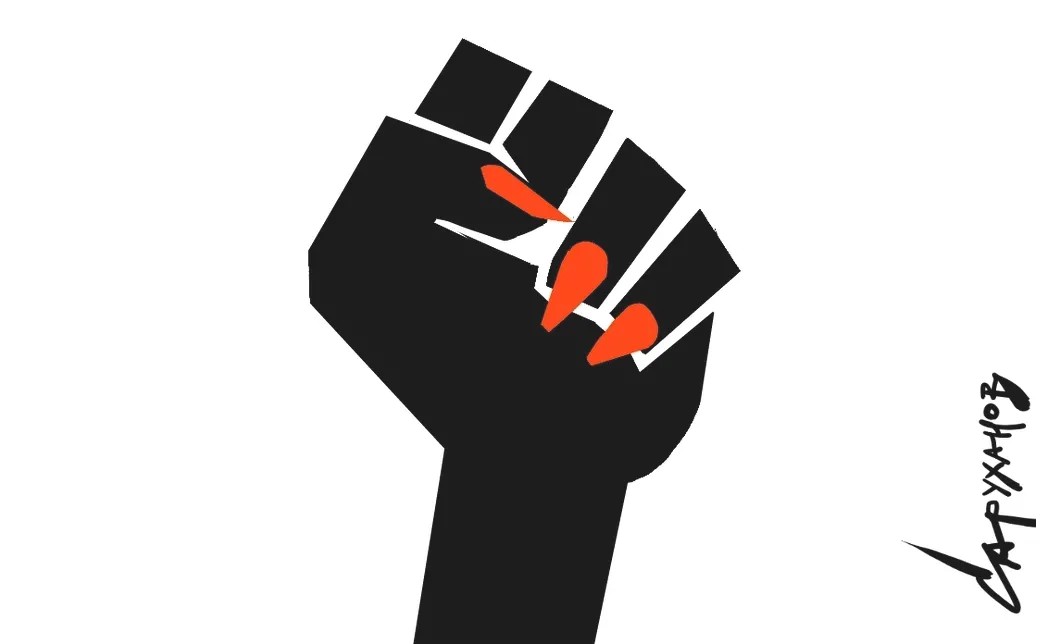
CRACKDOWN PREVIEW.Single pickets protesting the proposed legislation have been held across the country over the weekend, with dozens of activists arrested. Among them was transgender activist Polina Symonenko. According to the LGBT+ Faction movement, she will remain under arrest for 14 days. She will be forced to serve in a men's detention center. Activists fear Polina will be humiliated and bullied by both prison staff and inmates there.
WHO'S BEHIND THE BILL?The draft bill, which aims to "strengthen the family institution," was authored by a group of lawmakers, including ultra-conservative Yelena Mizulina from Putin's ruling party. She was also behind Russia's "gay propaganda" law adopted in 2013.
NO DEMOCRACY WITHOUT GENDER EQUALITY.Russia's crackdown hasn't been limited to the LGBT+ community. In recent weeks, the Kremlin has clamped down opposition forces, journalists, activists, and feminists. Our columnist Kirill Martynov argues that the issue of gender equality concerns everyone - and how we respond to this now depends on what kind of society we want to live in as a whole.
"It is impossible to dream of democracy in Russia, having sealed half of the citizens' mouth," writes Martynov.
BACKSTORY. LGBT+ rights in Russia have been deteriorating for years now. In 2013, the country passed an anti "gay propaganda" law, which banned exposing minors to LGBT+ materials. Human rights groups say the law has exacerbated hostility towards LGBT+ people and has had a detrimental effect on queer children. It has also been used to prosecute activists and artists. Officials have also been turning a blind eye to the brutal torture and killings of LGBT+ people in the country, including the anti-gay purges in Chechnya, which our reporter Yelena Milashina exposed in 2017.
Read about the draft bill here and Kirill Martynov’s op-ed here.
Поддержите
нашу работу!
Нажимая кнопку «Стать соучастником»,
я принимаю условия и подтверждаю свое гражданство РФ
Если у вас есть вопросы, пишите [email protected] или звоните:
+7 (929) 612-03-68
Russia’s Regions Struggle To Cope With Growing Pandemic
Despite thousands of new cases still being registered daily, Russia is reopened for business. Since officials relaxed lockdown measures ahead of the constitutional vote, Russia’s regions have especially struggled with growing case numbers amid a shortage of hospital facilities.
REGIONAL RED ZONE.Last month we reported on cases spiking in the northwestern region of Murmansk following the easing of quarantine measures in June. The region is experiencing some of the highest daily case increases in the country, with up to 180 new infections recorded each day. Yet visitors no longer have to quarantine, and supermarkets and parks are crowded.
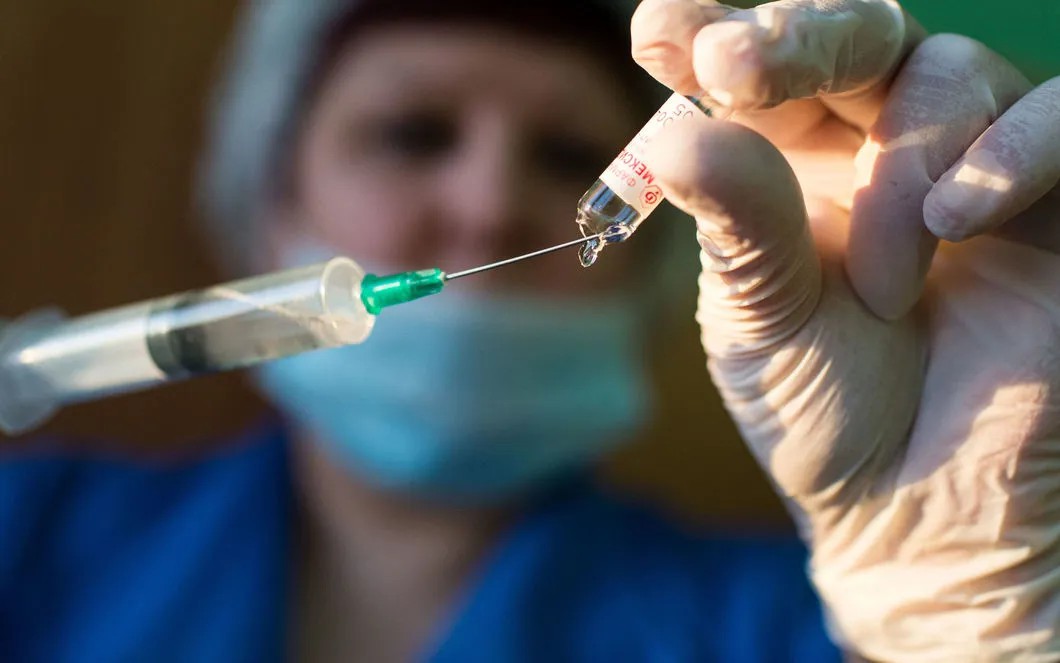
BED SHORTAGES. Ambulances receive 700 Covid-19 calls a day, but there are only a thousand beds in the region. This month, many Covid-19 patients were loaded onto a bus and relocated from the regional hospital to the former institute building. A nursing station is set up there, and a doctor from the neighboring city of Kola visits once a day. That’s the only way the hospital has been able to free up beds for the most severe patients.
THE SITUATION IS BAD IN OMSK TOO. In May, authorities claimed that this Siberian region was reaching the peak of the epidemic, with 20-30 new infections recorded each day. Since then, the number of cases has only continued to grow. But that didn’t stop the officials from canceling the self-isolation regime. Following the constitutional vote, the daily case numbers have been steadily climbing towards the 100 mark.
HOSPITALS SHORT ON SPACE. A 34-year-old woman told us she waited for 11 hours to see a doctor after calling an ambulance. Scans showed bilateral pneumonia with 50% lung damage, but doctors wouldn’t hospitalize her due to a lack of free space. She was sent home, but her condition deteriorated. An ambulance took her to the hospital the next day, but they refused to admit her again.
“They told us there are no places at any of the hospitals in the city. How can this be? Pneumonia is only treated at home when there is 20% lung damage. I have 50% lung damage. It turns out they send us home to die! Because there are no places!” 34-year-old Natalia said.
AUTHORITIES DENY PROBLEM.The Omsk Health Ministry has confirmed that Omsk residents with 50% lung damage are denied hospitalization. However, they maintain that it’s not due to a lack of hospital beds, but because there is no need to hospitalize them.
Read the full story on the situation in Murmansk here and Omsk here.
Khabarovsk Uprising, Continued
Khabarovsk, the largest city of Russia's far east, has been protesting for more than a week. In a sign of rising regional frustration with Putin's over-centralized state, tens of thousands of locals are on the streets demanding the release of arrested governor Sergei Furgal. He faces murder accusations dating 15 years back, many believe they are politically motivated.
KREMLIN'S MISCALCULATION.What's happening in Khabarovsk indicates the ruling elite has made a gross miscalculation in the assessment of the post-constitutional vote situation, argues our politics editor Kirill Martynov. Instead of citizens unifying behind Putin's power grab, sympathy for the political opposition is building around the country.
PUSHBACK IS GROWING.Earlier this month, some 30,000 people rallied in support of Furgal. Last weekend, those numbers surged, with some 50,000 joining the protests. That's a significant portion of the city's 600,000 population. Not only are protests growing in Khabarovsk, but solidarity rallies are taking place too. Over the weekend, the far eastern region of Vladivostok held a demonstration in support of its neighbors.
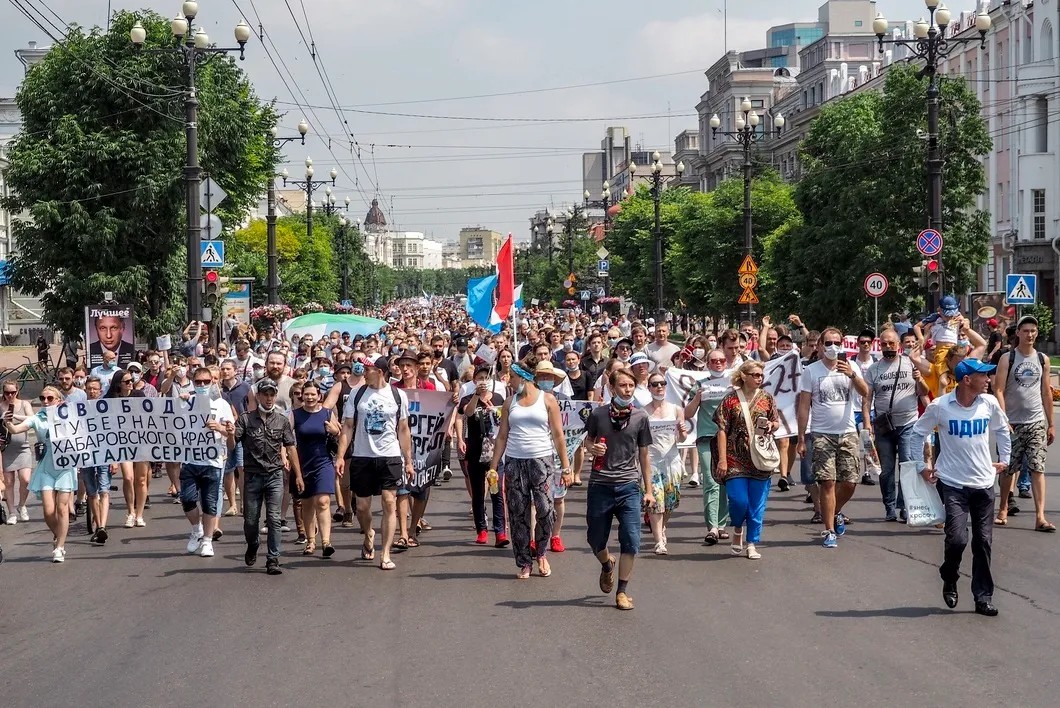
RALLIES NOT RIOTS. Over the past week, Khabarovsk has managed to debunk the myths perpetuated by Russia's propaganda machine, including that peaceful civic demonstrations turn into mass riots. The week of rallies has gone by without arrests, vandalism, or damaged property. Police have not interfered with the protests, which indicates that the real catalyst for the "unrest" isn't the people but the security officials.
PUTIN APPOINTS NEW GOVERNOR.On Monday, Putin appointed Mikhail Degtyarev, a Moscow-based deputy from Russia's Liberal Democratic Party as the interim governor of the Khabarovsk Territory after dismissing Furgal. Newcomer shares with Furgal the same semi-opposition party. Still, many believe the appointment of a Muscovite to the far east region won't appease the locals.
Read Kirill Martynov’s op-ed here and more on the new governor here.
Other Top-Stories Russia Has Been Reading
- MONETARY REFORM MURMURS. Talks of a new ruble denomination are flaring up across the country. They leave some fearing that authorities are planning to make a grab for people's savings, writes our economist Dmitry Prokofiev. The Great Lockdown fallout and collapsing oil prices bring the country's economy to the edge. Russia's export revenue is the lowest it's been since 2005. At the same time, despite efforts to clamp down on consumption (restricting trade, reducing wages), authorities failed to radically reduce imports. As a result, the inflow of foreign currency to the country amounted to only $0.6 billion - that's 36 times less than in the first quarter. So why didn't the ruble collapse? Because the Central Bank sold $12.9 billion from the National Wealth Fund and foreign exchange reserves in the market in three months, says Prokofiev. Nevertheless, he warns that the current circumstances can quickly push the authorities to take radical decisions on monetary circulation. The fact that the idea of a "new ruble denomination" has appeared in the public space may indicate that such plans are being discussed.
Thanks for reading!To keep up with Novaya Gazeta’s reporting throughout the week, you can follow us on Facebook, Twitter, Instagram, and Telegram. Our video content is available on Youtube and don’t forget to visit our website for the latest stories in Russian.
— The Novaya Gazeta Team
Поддержите
нашу работу!
Нажимая кнопку «Стать соучастником»,
я принимаю условия и подтверждаю свое гражданство РФ
Если у вас есть вопросы, пишите [email protected] или звоните:
+7 (929) 612-03-68
